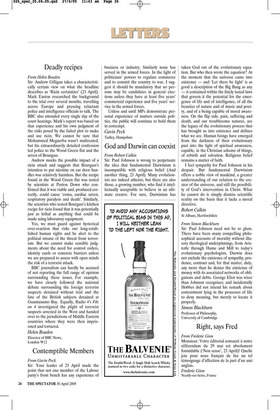Deadly recipes
From Helen Boaden
Sir: Andrew Gilligan takes a characteristically certain view on what the headline describes as ‘Ricin certainties’ (23 April). Mark Easton researched the background to the trial over several months, travelling across Europe and pressing reluctant police and intelligence officials to talk. The BBC also attended every single day of the court hearings. Mark’s report was based on that experience and his own judgment of the risks posed by the failed plot to make and use ricin. We cannot be sure that Mohammed Meguerba wasn’t maltreated, but his extraordinarily detailed confession led police to the Wood Green flat and the arrest of Bourgass.
Andrew mocks the possible impact of a ricin attack and suggests that Bourgass’s intention to put nicotine on car door handles was relatively harmless. But the recipe found in the Wood Green flat was tested by scientists at Porton Down who confirmed that it was viable and, produced correctly, could cause ‘coma, cardiac arrest, respiratory paralysis and death’. Similarly, the scientists who tested Bourgass’s kitchen recipe for ricin found that it was potentially just as lethal as anything that could be made using laboratory equipment.
Yes, we must guard against hysterical over-reaction that risks our long-established human rights and be alert to the political misuse of the threat from terrorism. But we cannot make sensible judgments about the need for control orders, identity cards or concrete barriers unless we are prepared to assess with open minds the risk of a terrorist attack.
BBC journalism can hardly be accused of not reporting the full range of opinion surrounding these issues. For example, we have closely followed the national debate surrounding the foreign terrorist suspects detained without trial and the fate of the British subjects detained at Guantanamo Bay. Equally, Radio 4’s File on 4 investigated the plight of terrorist suspects arrested in the West and handed over to the jurisdictions of Middle Eastern countries where they were then imprisoned and tortured.
Helen Boaden Director of BBC News, London W12
Contemptible Members
From Gavin Peck
Sir: Your leader of 23 April made the point that not one member of the Labour party’s front bench has any experience of business or industry. Similarly none has served in the armed forces. In the light of politicians’ powers to regulate commerce and to commit the country to war, I suggest it should be mandatory that no persons may be candidates in general elections unless they have at least five years’ commercial experience and five years’ service in the armed forces.
Unless and until MPs demonstrate personal experience of matters outside politics, the public will continue to hold them in contempt.
Gavin Peck Tadley, Hampshire
God and Darwin can coexist
From Robert Calkin
Sir: Paul Johnson is wrong to perpetuate the idea that fundamental Darwinism is incompatible with religious belief (And another thing, 23 April). Many evolutionists are indeed atheists, but there are also those, a growing number, who find it intellectually acceptable to believe in an ultimate creator. For sure, Darwinism has taken God out of the evolutionary equation. But who then wrote the equation? At the moment that the universe came into existence — and ‘Let there be light’ is as good a description of the Big Bang as any — it contained within the finely tuned laws that govern it the potential for the emergence of life and of intelligence, of all the beauties of nature and of music and poetry, and of a being capable of moral awareness. On the flip side, pain, suffering and death, and our troublesome natures, are the legacy of the evolutionary process that has brought us into existence and defines what we are. Human beings have emerged from the darkness of their evolutionary past into the light of spiritual awareness, capable, in the Christian scheme of things, of rebirth and salvation. Religious belief remains a matter of faith.
I feel sympathy for Paul Johnson in his despair. But fundamental Darwinism offers a noble view of mankind, a greater understanding of our relation to the creator of the universe, and still the possibility of God’s intervention in Christ. What he cannot do is simply dismiss scientific reality on the basis that it lacks a moral directive.
Robert Calkin
St Albans, Hertfordshire From Simon Blackburn
Sir: Paul Johnson need not be so glum. There have been many compelling philosophical accounts of morality without illusory theological underpinnings, from Aristotle through Hume and Mill to today’s evolutionary psychologists. Darwin does not exclude the existence of sympathy, prudence, contract and, for that matter, duty, any more than he denies the existence of money with its associated networks of obligations and debts. George Eliot was wiser than Johnson recognises; and incidentally Hobbes did not intend his remark about contentment lying in the processes of life to deny meaning, but merely to locate it properly.
Simon Blackburn Professor of Philosophy, University of Cambridge
Right, says Fred
From Frederic Gion
Monsieur: Votre éditorial consacré à notre référendum du 29 mai est absolument formidable (‘Non sense’, 23 April)! Quelle joie pour nous français de lire un tel témoignage d’affection de la part d’un ami anglais.
Frederic Gion
Neuilly-sur-Seine, France




















































 Previous page
Previous page